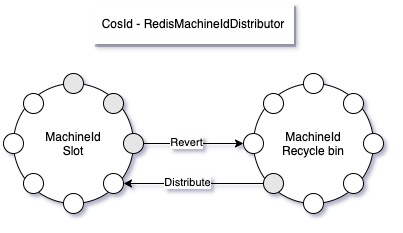CosId 旨在提供通用、灵活、高性能的分布式系统 ID 生成器。 目前提供了俩大类 ID 生成器:SnowflakeId (单机 TPS 性能:409W/s JMH 基准测试)、SegmentId( RedisIdSegmentDistributor 单机 TPS 性能(步长 1000):3687W+/s JMH 基准测试)。

SnowflakeId 使用
Long(64 bits) 位分区来生成 ID 的一种分布式 ID 算法。
通用的位分配方案为:timestamp(41 bits) +machineId(10 bits) +sequence(12 bits) = 63 bits 。
timestamp = (1L<<41)/(1000/3600/365) 约可以存储 69 年的时间戳,即可以使用的绝对时间为 EPOCH + 69 年,一般我们需要自定义 EPOCHmachineId = (1L<<10) = 1024 即相同业务可以部署 1024 个副本 (在 Kubernetes 概念里没有主从副本之分,这里直接沿用 Kubernetes 的定义)sequence = (1L<<12) * 1000 = 4096000 即单机每秒可生成约 409W 的 ID,全局同业务集群可产生 4096000*1024=419430W=41.9亿(TPS)。从 SnowflakeId 设计上可以看出:
timestamp 在高位,所以 SnowflakeId 是本机单调递增的,受全局时钟同步影响 SnowflakeId 是全局趋势递增的。machineId 需要手动设置,实际部署时如果采用手动分配 machineId,会非常低效。CosId-SnowflakeId 主要解决 SnowflakeId 俩大问题:机器号分配问题、时钟回拨问题。 并且提供更加友好、灵活的使用体验。
目前 CosId 提供了以下三种
MachineId分配器。
cosid:
snowflake:
machine:
distributor:
type: manual
manual:
machine-id: 0
手动分配
MachineId。
cosid:
snowflake:
machine:
distributor:
type: stateful_set
使用
Kubernetes的StatefulSet提供的稳定的标识 ID 作为机器号。

cosid:
snowflake:
machine:
distributor:
type: redis
使用
Redis作为机器号的分发存储。
cosid:
snowflake:
clock-backwards:
spin-threshold: 10
broken-threshold: 2000
默认提供的 DefaultClockBackwardsSynchronizer 时钟回拨同步器使用主动等待同步策略,spinThreshold(默认值 10 毫秒) 用于设置自旋等待阈值, 当大于spinThreshold时使用线程休眠等待时钟同步,如果超过brokenThreshold(默认值 2 秒)时会直接抛出ClockTooManyBackwardsException异常。
public class MachineState {
public static final MachineState NOT_FOUND = of(-1, -1);
private final int machineId;
private final long lastTimeStamp;
public MachineState(int machineId, long lastTimeStamp) {
this.machineId = machineId;
this.lastTimeStamp = lastTimeStamp;
}
public int getMachineId() {
return machineId;
}
public long getLastTimeStamp() {
return lastTimeStamp;
}
public static MachineState of(int machineId, long lastStamp) {
return new MachineState(machineId, lastStamp);
}
}
cosid:
snowflake:
machine:
state-storage:
local:
state-location: ./cosid-machine-state/
默认提供的 LocalMachineStateStorage 本地机器状态存储,使用本地文件存储机器号、最近一次时间戳,用作 MachineState 缓存。
SnowflakeId)cosid:
snowflake:
share:
clock-sync: true
默认 SnowflakeId 当发生时钟回拨时会直接抛出 ClockBackwardsException 异常,而使用 ClockSyncSnowflakeId 会使用 ClockBackwardsSynchronizer 主动等待时钟同步来重新生成 ID,提供更加友好的使用体验。
JavaScript 安全的 SnowflakeId)SnowflakeId snowflakeId=SafeJavaScriptSnowflakeId.ofMillisecond(1);
JavaScript 的 Number.MAX_SAFE_INTEGER 只有 53 位,如果直接将 63 位的 SnowflakeId 返回给前端,那么会值溢出的情况,通常我们可以将 SnowflakeId 转换为 String 类型或者自定义 SnowflakeId 位分配来缩短 SnowflakeId 的位数 使 ID 提供给前端时不溢出。
SnowflakeId 解析成可读性更好的 SnowflakeIdState )cosid:
snowflake:
share:
friendly: true
public class SnowflakeIdState {
private final long id;
private final int machineId;
private final long sequence;
private final LocalDateTime timestamp;
/**
* {@link #timestamp}-{@link #machineId}-{@link #sequence}
*/
private final String friendlyId;
}
public interface SnowflakeFriendlyId extends SnowflakeId {
SnowflakeIdState friendlyId(long id);
SnowflakeIdState ofFriendlyId(String friendlyId);
default SnowflakeIdState friendlyId() {
long id = generate();
return friendlyId(id);
}
}
SnowflakeFriendlyId snowflakeFriendlyId=new DefaultSnowflakeFriendlyId(snowflakeId);
SnowflakeIdState idState=snowflakeFriendlyId.friendlyId();
idState.getFriendlyId(); //20210623131730192-1-0
Redis作为号段分发存储)cosid:
segment:
enabled: true
distributor:
type: redis
share:
offset: 0
step: 100
provider:
bizC:
offset: 10000
step: 100
bizD:
offset: 10000
step: 100
RedisIdSegmentDistributor 步长设置为 1 时(每次生成ID都需要执行一次 Redis 网络 IO 请求)TPS 性能约为 21W/s (JMH 基准测试),如果在部分场景下我们对 ID 生成的 TPS 性能有更高的要求,那么可以选择使用增加每次ID分发步长来降低网络 IO 请求频次,提高 IdGenerator性能(比如增加步长为 1000,性能可提升到 3545W+/s JMH 基准测试)。
cosid:
snowflake:
provider:
bizA:
# epoch:
# timestamp-bit:
sequence-bit: 12
bizB:
# epoch:
# timestamp-bit:
sequence-bit: 12
IdGenerator idGenerator=idGeneratorProvider.get("bizA");
在实际使用中我们一般不会所有业务服务使用同一个 IdGenerator ,而是不同的业务使用不同的 IdGenerator,那么 IdGeneratorProvider 就是为了解决这个问题而存在的,他是 IdGenerator 的容器,可以通过业务名来获取相应的 IdGenerator。
Kotlin DSL
val cosidVersion = "1.1.0";
implementation("me.ahoo.cosid:spring-boot-starter-cosid:${cosidVersion}")
<?xml version="1.0" encoding="UTF-8"?>
<project xmlns="http://maven.apache.org/POM/4.0.0"
xmlns:xsi="http://www.w3.org/2001/XMLSchema-instance"
xsi:schemaLocation="http://maven.apache.org/POM/4.0.0 http://maven.apache.org/xsd/maven-4.0.0.xsd">
<modelVersion>4.0.0</modelVersion>
<artifactId>demo</artifactId>
<properties>
<cosid.version>1.1.0</cosid.version>
</properties>
<dependencies>
<dependency>
<groupId>me.ahoo.cosid</groupId>
<artifactId>spring-boot-starter-cosid</artifactId>
<version>${cosid.version}</version>
</dependency>
</dependencies>
</project>
cosid:
namespace: ${spring.application.name}
snowflake:
enabled: true
# epoch: 1577203200000
clock-backwards:
spin-threshold: 10
broken-threshold: 2000
machine:
# stable: true
# machine-bit: 10
# instance-id: ${HOSTNAME}
distributor:
type: redis
# manual:
# machine-id: 0
state-storage:
local:
state-location: ./cosid-machine-state/
share:
clock-sync: true
friendly: true
provider:
bizA:
# timestamp-bit:
sequence-bit: 12
bizB:
# timestamp-bit:
sequence-bit: 12
segment:
enabled: true
distributor:
type: redis
share:
offset: 0
step: 100
provider:
bizC:
offset: 10000
step: 100
bizD:
offset: 10000
step: 100
Benchmark Mode Cnt Score Error Units
SnowflakeIdBenchmark.millisecondSnowflakeId_generate thrpt 4093924.313 ops/s
SnowflakeIdBenchmark.safeJsMillisecondSnowflakeId_generate thrpt 511542.292 ops/s
SnowflakeIdBenchmark.safeJsSecondSnowflakeId_generate thrpt 511939.629 ops/s
SnowflakeIdBenchmark.secondSnowflakeId_generate thrpt 4204761.870 ops/s
gradle cosid-redis:jmh
Benchmark Mode Cnt Score Error Units
RedisIdSegmentDistributorBenchmark.step_1 thrpt 25 220218.848 ± 2070.786 ops/s
RedisIdSegmentDistributorBenchmark.step_100 thrpt 25 3605422.967 ± 13479.405 ops/s
RedisIdSegmentDistributorBenchmark.step_1000 thrpt 25 36874696.252 ± 357214.292 ops/s
CosId 1.1.0 发布,通用、灵活、高性能的分布式 ID 生成器
原文:https://www.cnblogs.com/Ahoo-Wang/p/cosid-1-1-0.html